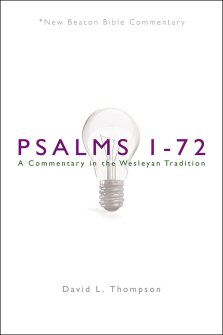Psalms 1–72: A Commentary in the Wesleyan Tradition (NBBC)
Digital Logos Edition
Overview
Perhaps no other book of the OT is more beloved, more widely used, and more often interpreted than Psalms. Psalms 1-72 is the first of two volumes on this treasured collection of hymns, praises, and prayers.
With scholarly precision, David Thompson brings to the forefront the meaning of each psalm, describing its background and original function in the life of God s people. He then skillfully steers the reader toward present-day applications, displaying a keen grasp of what the psalms mean in the light of Christ s coming. Through this commentary, pastors, worship leaders, teachers, and laypeople can gain increased insight into how each psalm best fits in worship, ministry, and daily life. Biblically sound and thoroughly relevant, this commentary is an essential guide to the church s most important book of prayer and song.

Key Features
- The Latest scholarship from notable experts in the Wesleyan tradition
- Comprehensive annotation covering background material, verse by verse exegesis, and practical application
- Clear verse-by-verse explanations offering contemporary Wesleyan understanding derived from the passage’s original language
Top Highlights
“Finally, these two pieces introduce the two most important themes of the Psalter: the blessing of life centered in Yahweh’s Torah, and the reign of Yahweh and the relationship of the king in Jerusalem to that reign.” (Page 68)
“Carrying on life (walk), positioning oneself (stand), and continuing association with mockers (sit in the company of …) all present significant traffic with the values and behaviors of persons at odds with the God of Israel. The truly glad person of Ps 1 is known first of all by the persons, attitudes, and behaviors with which this one does not identify.” (Page 70)
“But, strangely, Yahweh has ordained that his strength will best be seen in children and infants. These are totally dependent upon others for their life and care. Through these little ones Yahweh chooses actually to halt the mighty (v 2 [3 HB]). We are not told how this works except that Yahweh ordains it. Luther sees here the proclamation of Christ’s kingdom by ‘plain, simple, unsophisticated people, who are like infant children in that they set aside all reason, grasp and accept the Word with simple faith, and let themselves be led and directed by God like children’ (Pelikan 1955, 108).” (Page 95)
“The word blessed in Hebrew is a passive verb. Blessed assumes God has acted, bestowing some good upon a person. Recipients of these benevolent acts then are blessed. Such a translation is acceptable here, because the Psalter and this psalm explicitly assume the persons are profoundly happy because God has acted to save and to bless them. Their gladness is itself the gift of God. But, though this is assumed, the statement actually refers to the astounding happiness of persons known at least in part by their significant separation from the ungodly in Israel.” (Page 70)
- Title: Psalms 1–72: A Commentary in the Wesleyan Tradition
- Author: David L. Thompson
- Series: New Beacon Bible Commentary
- Publisher: Beacon Hill
- Print Publication Date: 2015
- Logos Release Date: 2017
- Pages: 318
- Era: era:contemporary
- Language: English
- Resources: 1
- Format: Digital › Logos Research Edition
- Subject: Bible. O.T. Psalms 1-72 › Commentaries
- ISBNs: 9780834131071, 9780834130906, 0834131072, 0834130904
- Resource ID: LLS:NBBC19PS1
- Resource Type: Bible Commentary
- Metadata Last Updated: 2024-08-30T23:38:13Z
Sample Pages from the Print Edition
Reviews
2 ratings
Mark Barth
9/29/2023
Mark Barth
9/29/2023
